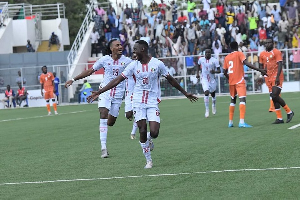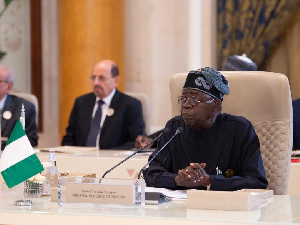Correspondence from Eastern Region:
Ghana's determination to attain universal primary education is being endangered by the lack of proper infrastructure for most basic schools, particularly those in the rural areas.
Although government has tried over the years to ensure that all children of school-going age are enrolled in school, that is being thwarted by various factors including poor infrastructure in primary schools.
One of such schools is the Dawa-Yokunor Primary School in the Eastern Region whose only survival rests on imminent assistance from the government or benevolent individuals and organisations.
The five-unit classroom structure without walls, doors or windows, is situated in a weedy compound and serves as the learning place for KG 1 to class six pupils.
Aside these, the lack of infrastructures such as tables and chairs is hampering academic activities at the school as very few furniture could be found in the classrooms for both pupils and teachers.
The skeletal classroom structure remains the only infrastructure standing on the compound with no washrooms, teachers’ common room, canteen, bookshop, etc. with teachers using under the trees as improvised staff common room and headmaster’s office.
None of the pupils was also found in a nose mask which is one of the critical COVID-19 protocols outlined by government for all schools before the reopening.
The school has a total enrolment of only 70 pupils from KG to class six out of which less than half had reported for school at the time of the visit by GhanaWeb.
Most of the pupils were found loitering in the community, bare-chested and unkempt.

Assemblyman for the Mensah-Dawa Electoral Area, Samson Atter Kwame in an interview with GhanaWeb identified the school as “the most deprived of all the schools” in his electoral area.
“The problem here is among the schools in my Electoral Area, this is the worst among them and the school too they don’t have desks, the teacher's table too is not good and also the community too don’t have water so when it is break time and the children are thirsty, unless they run to the house to get water to drink,” said the worried assemblyman who said some of the children failed to return to school after visiting their homes.
The school is also currently not enrolled onto the national school feeding programme, a situation the assemblyman blamed for the low enrolment and regular pupil absenteeism.
“They don’t have a canteen, nobody is selling in the school so if the children are hungry unless they go home to eat, if they go home then they’ll not come back again,” he said.
To solve the problem, Mr. Atter proposed that urgent steps be taken to enroll the school onto the feeding program.
Though he said he’s brought this to the attention of the Local Assembly, nothing has been forthcoming.
“They [Assembly] said they’re working on it so we’re waiting for them to come and help us else the children are in the house,” he noted.
Headmaster of the school, Mr Samuel Korlie who declined to speak on record however corroborated the assertions of the Assemblyman.
He also blamed the regular pupil absenteeism on the lack of school feeding programme in the school.

According to him, though he personally encourages parents to ensure that their children attend school every day, they fail to do this as enrolment and punctuality continue to remain poor.
Asked what steps the school was taking to address its myriad of infrastructural challenges, Mr. Korlie explained that management of the school together with the Circuit Supervisor for the area, in 2019 wrote to Plan International Ghana, a non-governmental organization (NGO) seeking assistance for the school.
He said though the NGO promised to come on board to support the school, they have been unable to do so, leaving the school to operate in its difficulties.
The school head also said only four subject textbooks on the new curricular have been given to the school.
The situation, he added, was affecting teaching and learning and other academic activities in the school and appealed to NGOs to come and offer the necessary assistance to the school.
However, some parents who spoke with GhanaWeb in the community denied that their children did not go to school due to the absence of the feeding in the school.
However, they could not provide any tangible explanation for their failure to ensure that their children attended school.
Public Relations Officer of the Ghana Education Service in Upper Manya Krobo, Charles Katey when contacted by GhanaWeb confirmed the plight of the school.
He however said a comprehensive report on the plight of the school was prepared last year by the Circuit Supervisor for the area and forwarded to the Upper Manya Krobo District Assembly for the necessary action.
Regional News of Sunday, 14 March 2021
Source: www.ghanaweb.com

















